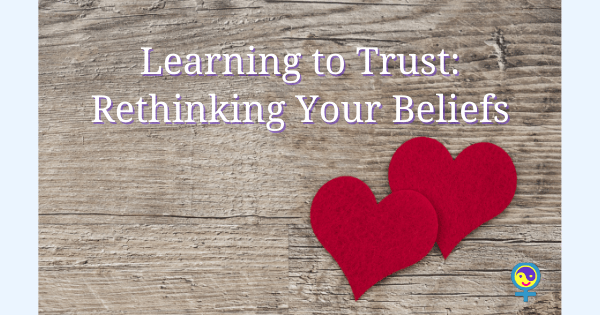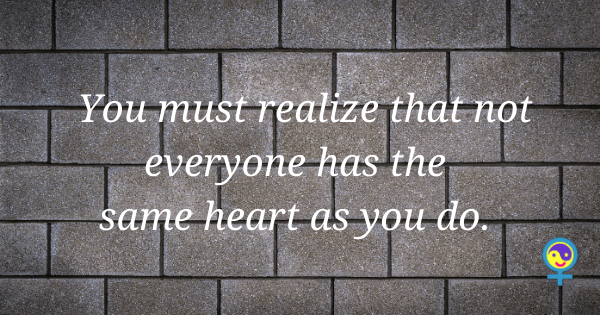Rethinking Your Beliefs

The pandemic has offered me the gifts of time and introspection. In this strange period, many truths have arisen that I believe are keys to greater health and happiness. One of the most powerful of these is the recognition that I must learn to trust myself first.
I am the co-creator of my life (along with my higher power.) No one else knows what is best for me, and only I have my best interest at heart completely. This is true for you too. We’ve all been given an inner voice that we must learn to honor.
This is such a powerful lesson that I split it into two parts. First, we will uncover the faulty beliefs that cause us to stop trusting ourselves to begin with (or at least did for me.) Then, in the next blog, we’ll address the “4 Steps to Finding Your Truth.” Please join me in this deep dive to uncover how to trust ourselves more, so our decisions reflect our highest good.
Why Trusting Yourself is So Hard
Trust yourself; you know what’s best.
Listen to your intuition.
Go with your gut.
Like me, you’ve probably heard some variation of these messages a million times. This is not new information. However, just as it has been hard for me to recognize that I must love myself first, the concept of trusting myself first has been a hard one for me to embrace.
Of course it has! We’re given totally contradictory messages. We are told to love ourselves and to trust our intuition when making decisions, yet we’re also told to be kind and to prioritize the needs of others in order to be “good.” Since one of my core values is to be a good and kind person, trusting myself and making my own decisions felt like actions that were in direct conflict with who I want to be. The cognitive dissonance left me confused and filled with doubt.
A Need to Reframe – Intention is Everything
In order to break the harmful cycle of putting others’ needs and ideas above my own, I had to reframe my values in relation to other people. I am not responsible for anyone else’s life or emotional state. My decisions, while they may affect another person, are not done with ill intent, and by that very fact, I am able to maintain my desire to be good and kind. Intention is everything.
The harsh reality is that the people around us benefit when we stop trusting ourselves. Even those who love us will push us to make decisions that don’t feel right because it is what they want. Family, colleagues, and friends all benefit when we have lost our ability to trust ourselves and stand up for our own needs, because under that state they can get us to do what they want. This is not always conscious manipulation on their part. Sometimes it’s just normal survival instincts at play. They might think they are steering you to do what’s best, or they may be deeply afraid that you might make the wrong decision. Regardless of the reason, they can’t possibly know what is best for you. Only you have that knowledge.
Understanding Your Blocks to Trust

Although I could conceptually understand the importance of trusting my instincts, I have struggled to live that way for many years. I now recognize that there were key blocks that prevented me from honoring my needs and inner knowing. Here are some to consider:
- Being an Empath or Highly Sensitive Person – these types of people are hardwired for compassion and driven to help others, sometimes at all costs. I am very sensitive and attuned to the emotions of others. I can feel when people are disappointed or hurt and I try desperately to make them feel better, which ultimately makes me feel better at first. I essentially push my own needs and feelings aside in favor of relieving the negative feelings of others. This works sometimes, but more often than not making decisions this way leaves me feeling disempowered and drained.
- Exhibiting Codependent Tendencies – similar to Empaths, people with codependency want everyone around them to be happy, and prefer peace to confrontation. They actually feel that they are responsible for the emotions of others. I also happen to be codependent, which again makes my default desire to people-please and over-give.
- Being Unable to Recognize Manipulation – when you are really focused on being kind and honest, and most of the people around you are the same, it’s very hard to conceive of someone being intentionally cruel or manipulative. Your mind just doesn’t work that way, and your compassionate nature wants to give people the benefit of the doubt. This leaves you very vulnerable to abuse. You must realize that not everyone has the same heart as you do.
- Following Spiritual Advice Without Discernment – spiritual teachings say to forgive quickly or turn the other cheek. This can cause us to disregard our inner radar that says something is wrong. [See “Two Beliefs That Steal an Empath’s Power” for more insight on how general advice can harm us.]
Key Questions for Discerning the Truth
Oftentimes your first impulse is the right one. If you feel like something is even a little off – it probably is. In order to discern fully if you are blocking your own inner knowing, you may need to dig a bit deeper by asking yourself the following powerful questions:
- “Who is benefitting from this decision/situation/action?” As a general statement on society – the powers in charge often benefit when we follow along with societal norms without question. It’s important to recognize how our ability to fit in or go along quietly can actually harm us and help someone else. Question everything from as objective a perspective as possible. It isn’t too hard to see that if your boss says, “I value you very much…,” and then proceeds to dump more work on you without additional compensation, that they don’t actually “value” you, but rather are using you for their own gain. That might be fine if you feel you are being treated fairly, because work is after all a transactional activity. But, being clear on what is happening is important. Personally, I have had to understand that work is work. While I’ve always desired genuine friendships from my work roles, it’s rare to find managers who actually care about your well-being in a work environment. Their focus is business, and you are just a means to an end. I have had several managers tell me I was replaceable. Why would someone ever say such a harsh thing when no human is truly replaceable? The easy answer to that is control. They diminish your spirit and confidence so that you won’t attempt to leave.
- “Do I even like this person?” This one makes me chuckle. Even though I am very kindhearted, I dislike most people. I find the majority of people to be selfish and I generally see that nature in someone very quickly. However, because I am so focused on being “nice” I will push aside that feeling to try to see the best in that person. The true test of whether someone is worth your time and energy is if you generally like them and feel good in their presence. If you don’t like them, then why give them any of your energy?
- “How do I FEEL?” Feelings (or vibes) don’t lie. They are the way your intuition speaks to you. If you feel uncomfortable or uneasy around someone, that’s a very clear sign that you should probably minimize your association with them.
It may help to journal your answers to these questions or talk them through with a trusted friend. Try very hard not to second-guess yourself. Your intuition is quick. It’s generally your first reaction. If you have a tendency to overthink, as I do, you can talk yourself right out of the truth.
I hope this has helped you recognize why and how you give your power away when you don’t trust yourself. Please watch for the next blog where we go deeper in learning how to trust yourself through, “4 Steps to Finding Your Truth.”
So, it looks like the Full Moon has been a source of creativity for me! Just as in last month’s blog, I am again writing this as we approach the Full Moon in Gemini. This month I am ready to let go of trusting others instead of myself. What are you ready to release?
Michelle Gibeault Traub is a health writer, compassionate coach, and the author of Online Dating for Sensitive Women. Her mission is to help women be their best in body, mind & spirit.
Sign up for Michelle’s FREE Gifts – The Natural Healing Toolkit and 33 Ways to Add More Joy to Your Life.
